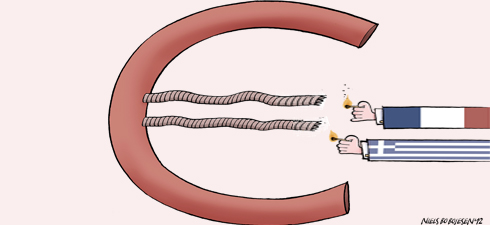In rural France on Sunday night, the newly-elected French president took to the stage and announced that he would lead the battle in Europe against austerity. On the other side of the continent, Greek voters were calling his bluff. By overwhelmingly opting for parties that want to either repudiate or renegotiate Greece’s bailout deal, they have handed François Hollande a painful dilemma. Will he stand with the Greek people against austerity? Or will he stand with the German government and the International Monetary Fund, in insisting that the Greek bailout cannot be renegotiated?
The choice Mr Hollande makes will be fateful, for France and Europe. Potentially, France’s new president could position himself as the head of Europe’s southern rebels. There is no doubt that the Spanish and Italian governments – even if nominally from different political families – have been cheering on the French socialist. They, like the Greeks, desperately want to see a challenge to German austerity orthodoxy.
Yet any French effort to isolate Germany within the EU would be a historic shift in postwar French foreign policy – which has been built around the idea that the “Franco-German couple” should run the EU together. Allying France with the European south would also damage France’s self-image, as one of the stronger economies in Europe. The perception of France in financial markets could also worsen. Most damaging of all, an open split between France and Germany would cause Europe-wide problems, opening up a seismic fault in the foundations of the EU and its single currency.
Was this article useful? If so we are delighted!
It is freely available because we believe that the right to free and independent information is essential for democracy. But this right is not guaranteed forever, and independence comes at a cost. We need your support in order to continue publishing independent, multilingual news for all Europeans.
Discover our subscription offers and their exclusive benefits and become a member of our community now!












